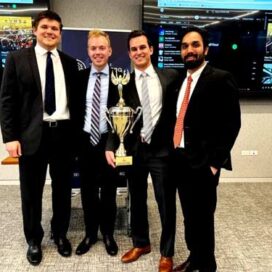Pushing MBA’s beyond the books
Published: August 10, 2005 / Author: Jeffrey York
NEWS ANALYSIS
Scott Miller, a recent alum of the University of Southern California Marshall School of Business, has created the kind of impact not many B-school students have. Last school year, he was one of two students who served on the school’s curriculum innovation committee. As vice-president of student affairs for Marshall ‘s student government, Miller was charged with bringing student perspective into meetings with administrators, industry executives, and professors.
The result: an almost total overhaul of the Marshall curriculum, to go into effect when classes resume in late August. It typifies the slew of curriculum changes B-schools are implementing in hopes of making their programs more effective and competitive in a tightening environment.
LOSING RELEVANCE. “At Marshall , faculty research wasn’t being brought into the classroom,” says Miller. “Students also had concerns over whether we would be able to apply what we were learning in the classroom when we got out.”
Thanks to work by him as well as new dean Yash Gupta and a task force of interested parties, Miller says incoming students can’t help but get a better, more integrated education than he did. Miller hopes the curriculum will achieve the overarching goal of removing the separation among individual courses while giving students the benefits of their professors’ ongoing research.
The feeling, it seems, isn’t unique to Marshall . Whether they chose to defend their current system or trumpet new curriculum changes, deans and program directors of many top U.S. MBA programs have recently felt compelled to respond to accusations from students, professors, and recruiters who say the degree is losing its relevance to business.
EVERYBODY’S DOING IT. Some of that discussion was prompted by a controversial article Warren Bennis and James O’Toole recently wrote in the Harvard Business Review. It argued that B-schools spend too much time on academic research and should start focusing on the corporate world’s real needs.
Of the 40 or so institutions BusinessWeek Online spoke to in recent weeks, about two dozen say they’ve responded to such criticism with at least one new initiative aimed at making their curriculums more relevant to recruiters. Some schools are coming up new offerings in leadership and complex problem solving, while others like Marshall have decided to scrap their old system altogether, taking the less-traveled (and much more risky) road of innovation.
Schools have good reason to work overtime to defend their increasingly vulnerable market share. Applications to top-tier MBA programs are down almost 30% since 1998 (see BW Online, 8/9/05 , “MBA Applications: Still Skidding”). A widespread changing of the guard has also occurred. At least seven top schools had major turnover in leadership since the start of 2005, including Harvard Business School, Yale School of Management, and the University of Virginia Darden School of Business. And at least three second-tier schools are doing the same.
ONE FRAMEWORK WON’T DO. No one seems to question whether top schools teach the nuts and bolts of business. But there are also calls for students to be prepared to address more out-of-the box issues and problems.
Michael Riegel, a recruiter for IBM (IBM) in Research Triangle Park , N.C. , has hired people from many U.S. MBA programs for important positions. “I take it for granted that the students will have the core skills,” Riegel says.
MBAs also need strong values and communication skills and, perhaps most important, the ability to formulate and implement a strategic plan. “Schools need more examples of complex problem solving,” says Riegel. “I’ve never seen a problem where one framework did the trick.”
CUTTING-EDGE RESEARCH. Indeed, today’s managers must understand increasingly complex frameworks that transcend traditional subject areas. To address this reality, Marshall , along with Gupta, has undertaken what may be the most intensive overhaul of any school. “It’s a total transformation of experience, not just curriculum,” says Gupta.
Instead of a typical core curriculum design, Marshall ‘s four first-year terms will be broken down by theme, with a cross-functional group of faculty managing each. The first will communicate the “language of business;” the second will deal with “understanding money, customers, and employees;” the third “managing and integrating operations;” and finally, in quarter four, “achieving global perspective.” Each piece will fit into that quarter’s theme — an attempt to integrate multiple frameworks to solve global business problems.
In year two, students will study within one or more of Marshall ‘s 11 research centers. Tied to a student’s concentration, the centers are independently funded organizations designed to establish a connection among faculty research, industry needs and realities, and classroom teaching. They’re designed to give second-year students exposure to cutting-edge research that will enhance their studies and arm them with the most up-to-date skills in their field of choice.
SCULPTING LEADERS. Other programs have changed their core course offerings to include lessons in leadership and more integrated approaches to business problems. This year Notre Dame Mendoza College of Business in South Bend , Ind. , will require its students to complete a new course on problem solving. It’s delivered at the end of the core to show students how to apply newly acquired skills to difficult situations typically encountered within industries like management consulting.
“Getting better involves learning by doing,” says Steve Jones, dean of the University of North Carolina at Chapel Hill Kenan-Flagler Business School. That’s why UNC recently developed the Kenan Leadership Institute. The mandatory initiative includes in-class consulting projects with local companies and systematic feedback from a leadership coach, as well as small group discussions, workshops, and networking activities — all aimed at molding students into active leaders.
While UNC and Notre Dame have made additions to their core, the University of California-Irvine Merage School of Business has undertaken changes almost as radical as Marshall ‘s. On top of revamping all its first-year core courses, Irvine has turned the second year into a more hands-on experience during which students can explore their own potential for innovation.
CEOs WANT HELP. In the second and third quarter, a new experiential learning course takes a similar format to the consulting-project model popular at many schools. Students work in teams to solve a loosely defined problem solicited from Irvine ‘s corporate partners. For example, students might help a company like toymaker Mattel (MAT ) manage new product development at a time when America ‘s population is getting older and more fertile markets reside overseas.
But Irvine will demand that students take their business analysis one step further. The final quarter will focus on a capstone project that, ideally, will attempt to address a company’s impending challenges. Students will perform a broad industry assessment to make recommendations for long-range strategies.
“CEOs tell us that they’re so focused on short-term performance that they would appreciate help in thinking about these longer-term issues,” says Vijay Gurbaxani, professor of information technology and associate dean of Irvine ‘s MBA program. “It will also help students figure out the cross-functional nature of management challenges that senior executives face.”
INNOVATION FACTOR. “How will the new curriculum work?” asks USC’s Gupta. “Only time will tell.” Everyone hopes that the dean’s roundtable discussions with recruiters, professors, and students like Miller will make for effective change. Because, like the leaders they study and emulate, deans and faculty ultimately must answer to both their shareholders (the students) and customers (the recruiters).
In today’s competitive B-school environment where applicants are the stock, innovation just may be the determining factor in whether their shares rise or fall.
/news_and_events/news_articles/article/3730/pushing-mba-s-beyond-the-books
Related Stories




